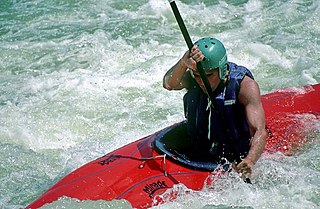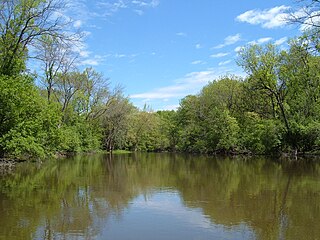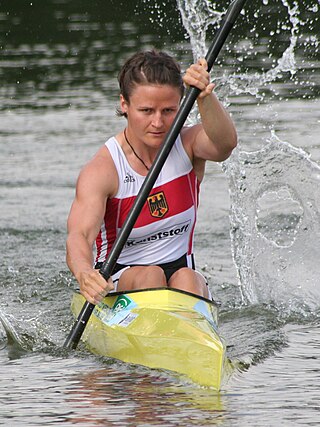Related Research Articles

A kayak is a small, narrow human-powered watercraft typically propelled by means of a long, double-bladed paddle. The word kayak originates from the Inuktitut word qajaq. In British English, the kayak is also considered to be a kind of canoe.

Kayaking is the use of a kayak for moving over water. It is distinguished from canoeing by the sitting position of the paddler and the number of blades on the paddle. A kayak is a low-to-the-water, canoe-like boat in which the paddler sits facing forward, legs in front, using a double-bladed paddle to pull front-to-back on one side and then the other in rotation. Most kayaks have closed decks, although sit-on-top and inflatable kayaks are growing in popularity as well.

Canoeing is an activity which involves paddling a canoe with a single-bladed paddle. Common meanings of the term are limited to when the canoeing is the central purpose of the activity. Broader meanings include when it is combined with other activities such as canoe camping, or where canoeing is merely a transportation method used to accomplish other activities. Most present-day canoeing is done as or as a part of a sport or recreational activity. In some parts of Europe canoeing refers to both canoeing and kayaking, with a canoe being called an open canoe.

Canoe freestyle is a discipline of whitewater kayaking or canoeing where people perform various technical moves in one place, as opposed to downriver whitewater canoeing or kayaking where the objective is to travel the length of a section of river. Specialised canoes or kayaks (boats) known as playboats are often used, but any boat can be used for playing. The moves and tricks are often similar to those performed by snowboarders, surfers or skaters, where the athlete completes spins, flips, turns, etc. With modern playboats it is possible to get the kayak and the paddler completely airborne while performing tricks. The competitive side of playboating is known as freestyle kayaking.

Canoe sprint is a water sport in which athletes race in specially designed sprint canoes or sprint kayaks on calm water over a short distance. Prior to November 2008, canoe sprint was known as flatwater racing. The term is still in use today but is often used as a hypernym for both canoe marathon and canoe sprint. Similarly, the term 'canoeing' is used to describe both kayaking and canoeing.

The Des Plaines River is a river that flows southward for 133 miles (214 km) through southern Wisconsin and northern Illinois in the United States Midwest, eventually meeting the Kankakee River west of Channahon to form the Illinois River, a tributary of the Mississippi River.

The Dusi Canoe Marathon is a marathon canoe race held over three days between Pietermaritzburg and Durban, South Africa. It is run along the Msunduzi and Mgeni Rivers over a total distance of 120 kilometres (75 mi). The race attracts between 1600 and 2000 paddlers each year, making it the biggest canoeing event on the African continent. It is organised by the Natal Canoe Club. The clubhouse is located on the banks of the Msunduzi River, at the exact start point of the race.
The Massive Murray Paddle, formerly the Red Cross Murray Marathon or Murray Marathon, and later the YMCA Massive Murray Paddle, is an Australian 415 km, 5-day canoe/kayak flatwater race on the Murray River. One of the longest annual flatwater canoe races in the world, it starts in Yarrawonga and ends in Koondrook. The race raises funds to assist local community-driven programs.

A sprint canoe is a canoe used in International Canoe Federation canoe sprint. It is an open boat propelled by one, two or four paddlers from a kneeling position, using single-bladed paddles. The difficulty of balance can depend on how wide or narrow the canoe is, although regularly the less contact a canoe has with the water the faster it goes. This makes the narrower boats much faster and popular when it comes to racing.
The ICF Canoe Sprint World Championships are an international event in canoe racing, one of two top-tier Summer Olympic sport events organized by the International Canoe Federation. They are usually held every non-Olympic year and have officially included paracanoe events since 2010; paracanoe-specific editions of this event are usually held in Summer Paralympic years.
Canoe Wales is the national governing body for paddlesport in Wales. It covers all branches of the sport from recreational canoeing, kayaking, stand up paddleboarding and rafting to whitewater racing, slalom racing and wildwater racing; flatwater sprint racing and marathon racing; canoe sailing; canoe polo; surf kayaking and canoeing; and extreme racing. The organisation has over 2,700 members including individual paddlers as well as affiliated club members. Full adult members of Canoe Wales are also by default Welsh members of Paddle UK.

Sprint kayak is a type of canoe sprint held on calm water. The paddler is seated, facing forward, and uses a double-bladed paddle pulling the blade through the water on alternate sides to propel the boat forward. Kayak sprint has been in every summer Olympics since it debuted at the 1936 Summer Olympics. The sport is governed by the International Canoe Federation.

Canoe marathon is a paddling sport in which athletes paddle a kayak or canoe over a long distance to the finish line. The International Canoe Federation states standard distance races are at least 10 kilometres (6.2 mi) without an upper limit, while short distance races are between 3.4 kilometres (2.1 mi), and 10 kilometres (6.2 mi). Many events are raced down sections of river, including currents or portages around obstacles. Some events attract thousands of competitors and are staged over several days.
Ivan Lawler is a British marathon canoeist who competed from the late 1980s to the late 1990s, winning five gold and two silver medals at the canoe marathon world championships. He also competed in canoe sprint, and won two medals in the K-2 10000 m event at the ICF Canoe Sprint World Championships with a gold (1990) and a silver. At club level, he has always competed for Elmbridge canoe club.
Jon Bowermaster is an oceans expert, journalist, author, filmmaker, adventurer and six-time grantee of the National Geographic Expeditions Council. One of the Society's 'Ocean Heroes,' his first assignment for National Geographic Magazine was documenting a 3,741 mile crossing of Antarctica by dogsled.

Canoeing – recreational boating activity or paddle sport in which you kneel or sit facing forward in an open or closed-decked canoe, and propel yourself with a single-bladed paddle, under your own power.
ICF Canoe Marathon World Championships is an International Canoe Federation competition in canoe marathon in which athletes compete over long distances. The race usually starts and ends at the same place, and includes portages. Race categories vary by the number of athletes in the boat, the length of the course, and whether the boat is a canoe or kayak. In a kayak, the paddler is seated in the direction of travel, and uses a double-bladed paddle. In a canoe the paddler kneels on one knee with the other leg forward and foot flat on the floor inside the boat, and paddles a single-bladed paddle on one side only. The World Championships were held every two years from 1988, becoming annual in 1998.

Norwich Canoe Club is based at Whitlingham, Trowse in Norwich, Norfolk, UK with Whitlingham Great Broad, Whitlingham Little Broad, River Yare and River Wensum on its doorstep. It is a canoe and kayak racing club that focuses on flatwater sprint canoeing and marathon canoeing. It is a friendly club where canoeing is safe and fun and welcomes anyone who wants to have a go on the water. The club has as many girls as boys and as many women as men and also many families who all come and paddle together. Members are all ages, from 7 to 70 so there is definitely a place for everyone.
The Riverland Paddling Marathon (RPM) is a paddling marathon held over 3 days on the June Long weekend on the Murray River from Berri to Morgan in South Australia. The RPM is not a single event but 6 events that are run consecutively. The RPM has been presented by the Marathon Canoe Club of South Australia since 1988. The other notable Paddling Marathon on the Murray is the Murray Marathon which is run further upstream in Victoria.

Canoeing South Africa is the governing body for the sport of canoeing and kayaking in South Africa.The body is affiliated to the International Canoe Federation (ICF) and the African Canoe Confederation.
References
- 1 2 3 4 5 Remembering conservationist and canoe-maker Ralph Frese Chicago Sun Times December 11, 2012 By Dale Bowman Retrieved December 18, 2012
- 1 2 3 4 5 6 7 8 9 Ralph Frese, 1926-2012 Chicago Tribune December 12, 2012 By Graydon Megan Retrieved December 18, 2012
- 1 2 http://1001chicago.com/115/ The Last Canoe by Paul Dailing Retrieved January 18th, 2017
- ↑ http://www.chicagonow.com/booth-reviews/2011/10/at-85-life-is-still-but-a-dream-for-mr-canoe-ralph-frese/ At 85, Life is Still But a Dream for Mr. Canoe, Ralph Frese by Seth Saith October 14th, 2011 Retrieved January 13, 2013
- 1 2 3 http://www.canoemarathon.com/ DesPlaines River Canoe & Kayak Marathon website, home page Retrieved December 18, 2012
- ↑ http://www.island63.com/about-john-ruskey-interview.cfm John Ruskey Interview Retrieved January 18, 2017
- ↑ http://www.barefootworkshops.org/articles/Community_John_Ruskey.html John Ruskey interview by Hilary Cline Retrieved January 19, 2017
- ↑ "Being Roger Ebert for a day: "Mr. Canoe" documentary at Chicago Maritime Museum". Chicago Sun-Times. Retrieved 2018-08-12.
- ↑ ""Mr. Canoe" Documentary Debut at CMM -" . Retrieved 2018-08-12.
- 1 2 https://news.wttw.com/2018/01/25/documentary-showcases-renowned-chicago-canoe-builder-ralph-frese Documentary Showcases Renowned Chicago Canoe-Builder Ralph Frese By Alex Ruppenthal January 25th, 2018 Retrieved October 24, 2019
- ↑ https://www.adventuresportsnetwork.com/sport/paddle-sports/canoe-kayak/life-and-times-of-mr-canoe/ Life and Times of Mr. Canoe - Behind the scenes on a new cinematic tribute to canoe legend Ralph Frese by Canoe & Kayak January 11th, 2019 Retrieved October 25th, 2019
- 1 2 https://legacy.suntimes.com/obituaries/chicagosuntimes/obituary.aspx?n=ralph-frese&pid=161656640&fhid=2018 Ralph Frese obituary Retrieved October 25th, 2019
- ↑ https://www.dnainfo.com/chicago/20170630/dunning/portage-park-dunning-apartments-ralph-frese-chicagoland-canoe-base-demolition-zitella/ City's Last Blacksmith Shop Is No More As Ralph Frese Canoe Base Gets Razed June 30th, 2017 by Alex Nitkin Retrieved October 24, 2019
- ↑ http://fpdcc.com/ralph-frese-1926-2012/ "Ralph Frese, 1926 - 2012" December 11th, 2012 Official website of Forest Preserve District of Cook County Retrieved January 13, 2013